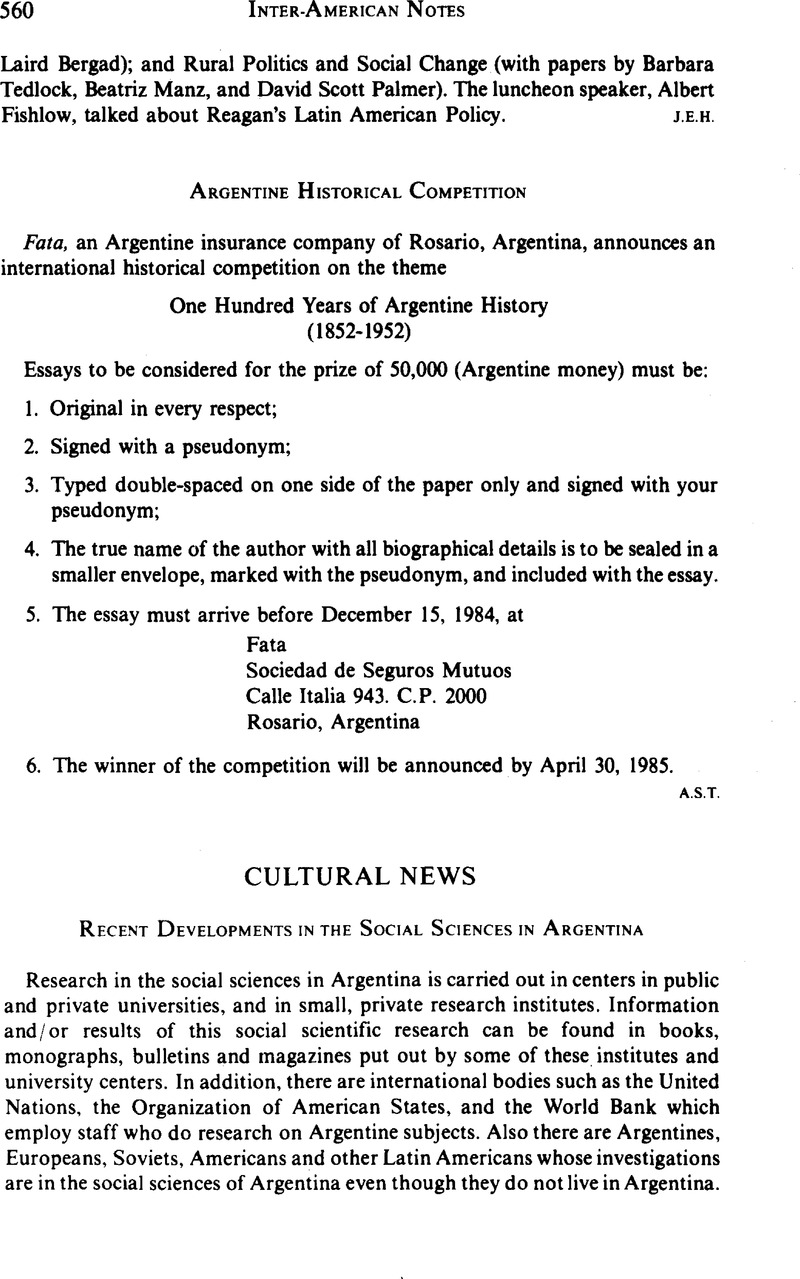No CrossRef data available.
Article contents
Cultural News: Recent Developments in the Social Sciences in Argentina
Published online by Cambridge University Press: 11 December 2015
Abstract

- Type
- Inter-American Notes
- Information
- Copyright
- Copyright © Academy of American Franciscan History 1984
References
1 Merkx, Gilbert W., “Argentine Social Science: CICSO,” Latin America Research Review, 14, No. 1 (1979), 220.Google Scholar Hereafter cited as LARR.
2 “Cierran la Carrera de antropología de la Universidad de Buenos Aires,” La Prensa, October 28, 1980, p. 10; and Reader, Lay, “Administrator and Teachers,” The Review of the River Plate, 158 October 22, 1980, 615.Google Scholar
3 See the listings of current social science research in the magazine Sociológica: Revista Argentina de Ciencias Sociales in issues no. 2/3 (1979), 295–317 and no. 4/5 (1980), 201–226; and Boletín de Ciencias Políticas y Sociales, no. 27(1981), and Boletín de Ciencias Políticas y Sociales, no. 27(1981), Universidad Nacional de Cuyo; and Merkx, 228–33.
4 See the issues of Sociológica and Merkx, op. cit.: and “El Departamento de Ciencias Sociales de la Fundación Bariloche: Diez Anos de Actividad,” LARR, 12, no. 3 (1977). 164–69; and World of Learning 1980–81, I (London: Europa Publications Limited, 1980), pp. 65–68; and Sautu, Ruth, “La sociología de la Argentina, 1958–1976,” LARR, 15 no. 3(1980), 199–200 Google Scholar; “PEHESA,” LARR, 15,no. 3 (1980), 190–94, Navarro, Marysa, “Research on Latin American Women,” Signs, 5 (Autumn 1979), 111–20CrossRefGoogle Scholar; and Hermitte, Esther M., “Grupo de Trabajo Sobre Proceso de Articulacion Social,” LARR, 12 no. 2 (1977), 138–48Google Scholar; and DiTella, Torcuato S., “Working-Class Organization and Politics in Argentina,” LARR, 16, no. 2 (1981), 33–56.Google Scholar
5 Peruse the previously cited articles for an overview of the topics of research of Argentine social scientists. The sociology discusses here is “theoretical”; there is also applied sociology which consists of social work, urban planning, housing, industrial sociology, public opinion, mass communication, and administration. Some other themes studied by the theoretical sociologists in Argentina were Peronism, poor neighborhoods, changes in the family, changes in sexual relations, the difficulties of industrialization and of forming capable managers, labor unions, modernization, social classes and social mobility, populism, internal migration, foreign immigration, elites, political systems, violence, dictators, economic development as part of the world system (mainly dependency theory), urban and regional studies, social psychology, bureaucratic-authoritarian regimes, and demography. These topics and names of those Argentines who have worked on them are found in an excellent article by DiTella, Torcuato S., “La sociología argentina en una perspectiva de veinte años,” Desarrollo Económico, 20 (October-December, 1980), pp. 312, and 315–22.Google Scholar
6 An example of research which is approached from a marxist and structuralist perspective is that done on women, Marysa Navarro, 114–15; Wainerman, Catalina H., Sautu, Ruth and de Lattes, Zulma Recchini, “The Participation of Women in Economic Activity in Argentina, Bolivia, and Paraguay,” LARR, 15, no. 2 (1980), 143–51Google Scholar; and Sautu, Ruth, “The Female Labor Force in Argentina, Bolivia and Paraguay,” LARR, 15, no. 2 (1980), 152–61.Google Scholar
7 See Merkx, op. cit.; and Borda, Orlando Fals, “The Negation of Sociology and Its Promise: Perspectives of Social Science in Latin America Today,” LARR. 15, no. 1 (1980), 161–66Google Scholar; and El Departamento de Fundación Bariloche,” 164–65.
8 For a discussion of dependency theory and how it applies to Latin America consult Cardoso, Fernando Henrique and Faletto, Enzo, Dependency and Development in Latin America (Berkeley: Univ. of California Press, 1979),Google Scholar first published in Spanish in 1969 as Dependencia y desarrollo en America Latina. Chilcote, Ronald and Edelstein, Joel (eds.), Latin America: The Struggle with Dependency and Beyond (Cambridge, Mass.: Shenknam, 1974)Google Scholar; Prebisch, Raul, “A Critique of Peripheral Capitalism,” CEPAL Review (First Semester 1976)Google Scholar; and Sunkel, Osvaldo, Capitalismo transnacional destintegracion national en America Latina (Buenos Aires: Ediciones Nueva Vision, 1972).Google Scholar
9 Some of the first structuralists in Argentina were those social scientists working in anthropology, see Hermitte, , “Grupo de Trabajo.” 138–48.Google Scholar
10 For a good discussion of the European structuralists including those linguists now working in the United States see Richard, and DeGeorge, Fernande, The Structuralists From Marx to Levi-Strauss (Garden City, N.Y.: Doubleday, 1972),Google Scholar especially the Introduction; and Piaget, Jean, Le structuralisme (Paris: Presses Universitaires de France, 1970).Google Scholar
11 Di Tella, , “La sociología argentina,” pp. 304, and 322–27.Google Scholar


